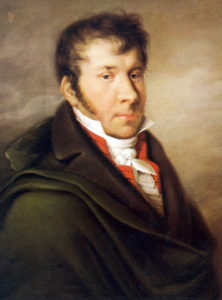Hummel, Trumpet Concerto
 Johann Nepomuk Hummel (1778-1837) was recognized early as a child prodigy. At the age of 8, he was taken by his father (a violinist) to Vienna and began studying piano with Mozart and even lived under Mozart’s roof (a practice not uncommon at the time). At about the age of 10, he was taken by his father on an extended concert tour of Europe, much as Leopold Mozart had done with his son.
Johann Nepomuk Hummel (1778-1837) was recognized early as a child prodigy. At the age of 8, he was taken by his father (a violinist) to Vienna and began studying piano with Mozart and even lived under Mozart’s roof (a practice not uncommon at the time). At about the age of 10, he was taken by his father on an extended concert tour of Europe, much as Leopold Mozart had done with his son.
Hummel would spend much of his adult life in Vienna. Beethoven moved from his home in Bonn to Vienna in 1792, and Beethoven’s fame would rise as Hummel came of age. The two forged a friendship although they were in many ways in competition with one another.
I featured a chamber work by Hummel a few years ago and wrote in that earlier post:
While Hummel is not terribly famous today, it’s hard not to drop names when talking about him. A virtuoso pianist and protégé of Mozart, he studied also with Clementi, Haydn, and Salieri. He studied alongside Beethoven, with whom he had a lifelong friendship. He assumed Haydn’s duties at Esterházy as Hadyn’s health declined. While playing at Beethoven’s funeral, he met Schubert, who dedicated his last three piano sonatas to him.
Hummel’s later years were spent in Weimar as the grand-ducal Kapellmeister. It was something of a plum post for him. His duties included conducting the major operas, and he was given three months off every year to continue his concert tours. In Weimar, he could rely on Johann von Goethe to introduce him to leading intellectuals of the time. He was described as an easygoing man of simple tastes and a good conversationalist who loved to walk through town and tend his garden.
He was apparently astute in business matters, partly due to his awareness of the financial difficulties experience by Mozart and Beethoven. Beethoven however changed the musical landscape and ushered in the Romantic era while Hummel stayed with more traditional forms. Consequently, despite his fame during his lifetime, history passed him by.
Hummel left a substantial corpus of music, including numerous works for solo piano, orchestral works and concertos, more than 20 operas, sacred music, chamber works, and songs. He composed only one trumpet concerto.



